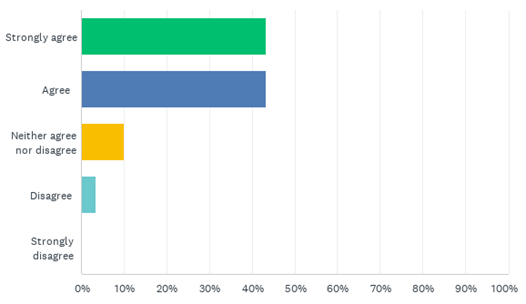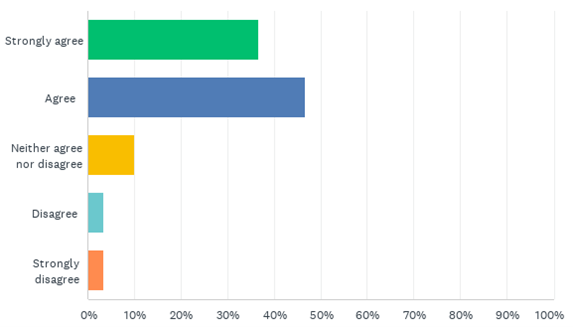The Gospel Initiative’s mission is to support the Church’s mission in creating a compelling, compassionate, and credible gospel presence in contemporary society.
We conduct ongoing research and host conferences related to the most difficult issues in our society. These resources are intended to help pastors and ministry leaders navigate through the complexity and imagine new strategies for gospel engagement. Resources are compiled jointly by TGI staff and program participants. The views and resources presented here do not necessarily represent those of Denver Seminary.
Compelling and Credible Witness: The Church and Sexual Identity
TGI hosted this event on January 28, 2022.
Research Questions and Findings
- The ex-gay movement promised orientation change that it never delivered and created a culture in the church where gay people were sent away to be fixed. This lingers today as a mixed message from evangelical churches regarding the acceptability of gay people.
- Public sex-related moral failure of high-profile evangelicals (e.g., Ted Haggard, Ravi Zacharias), regardless of the orientation of the failure, create challenges for churches and Christians to offer moral critique of sexuality in our culture regarding gay practice.
- The rising prevalence of affirming churches create public confusion about the Biblical message and sexual ethic that the church should live by.
- Stories of Christian parents who mistreat and even abandon their children when they “come out” furthers a cultural narrative of homophobia and undercuts our message of compassion and mercy.
- Pugilistic, yet so-called Christian responses to the Obergefell decision of 2015 confuse a watching world.
- Myths such as “the indomitable self” and “the right to sexual expression” cause evangelical counter-messages regarding gay practice to be easily interpreted as bigoted and harmful.
- Public education initiatives that do not share traditional evangelical sexual ethics have wide-reaching audiences and influence.
- Mass media that commodifies sex and objectives men and women create a powerful and compelling narrative and ethic that does not honor the gospel and increasingly looks on Christian sexuality as harmful.
- Gay people and their allies, especially those who have been harmed directly or indirectly by the church, face major challenges to belonging in Christian communities. These challenges to belong threaten their faith.
- The perception that Christianity is a public good. Such losses make genuine engagement with the gospel unthinkable for many.
- Churches and Christians who model repentance and sexual vulnerability create safety for sexually broken people to consider the church as a place they might belong.
- Celibate gay Christians are well postured to offer winsome critique of the culture’s broader sexual ethic.
- Long-term planning by Christian parents for age-appropriate dialogue with children beginning as early as age 4 about gay and same-sex issues that progress in topical complexity as they mature.
- Scenario planning for churches related to same-sex incidents (e.g., when a gay couple visits your church, when a child comes out, after a gay moral failure, etc.)
Conference Summary
On January 28, 2022, The Gospel Initiative hosted a conference at Denver Seminary titled, “Credible and Compelling Witness: The Church and Sexual Identity.” Dr. Preston Sprinkle (Center for Faith, Sexuality, and Gender) gave two keynote addresses. Dr. Greg Johnson (Memorial Presbyterian Church) and Mrs. Rachel Gilson (Cru) joined Dr. Sprinkle for a panel discussion moderated by Denver Seminary President Dr. Mark Young. The panel discussion recording is available to enrolled students upon request.
Topics discussed:
- The utility of phrases like “gay Christian,” whether and when to use them.
- Pastoral care and best practices regarding LGBT people in the church.
- How the Christian message to the gay/same-sex attracted community differs from the cultural message that one’s attractions must accompany certain lifestyle choices.
- Models of pastoral care and discipleship that allow gay and straight people to grow together in their relationship with Christ.
- Developing a public voice on issues of sexual identity outside of the church for the sake of the gospel.
- Perspectives on what a Christian response looks like to the Obergefell vs. Hodges decision of 2015 which said that bans on same-sex marriage were unconstitutional.
- The Equality Act and whether our posture or language towards is flows from the “culture wars.”
- Beginning age-appropriate conversations with children in the home and in the church on the topics of sexuality and sexual identity.
- Scenarios that church and ministry staff should talk through related to sexual identity in the church before they occur, such as when a gay couple comes to church, or when a child comes out.
- Whether practicing same-sex activity has larger effects on society, and what a Christian posture towards it looks like.
- Whether to attend a same-sex marriage ceremony for the sake of a relationship with a son or daughter.
- How to invite and welcome those in the gay community who are not following Jesus.
- How to counsel and support someone who is experiencing unwanted same-sex attraction.
100 people attended in-person, 113 attended virtually. Two evaluation questions are summarized below:
“I identified barriers to engagement on these issues in my ministry context.”

“As a result of attending, I feel better equipped to engage on these issues in my ministry context.”

TGI Resource List
These resources were consulted by The Gospel Initiative while exploring this issue. Some resources contain annotations and notes.
(n.d.) Denver Seminary Statement on Human Sexuality. Accessed by permission on August 23, 2021.
(2021) Our Beliefs: Human Sexuality. Harvest USA. Accessed September 10, 2021: https://harvestusa.org/our-beliefs/.
(2021) Statement on Sexual Ethics and Christian Obedience. ReVoice. Accessed September 10, 2021: https://revoice.us/about/our-beliefs/statements-of-conviction/statement-on-sexual-ethics-and-christian-obedience/.
(2021) Variables indicating the attitude of the U.S. population towards sex, sexuality, and related issues. General Social Survey. https://gssdataexplorer.norc.org/
Chapel, et. al. (2020). “Forty-Seventh General Assembly of the Presbyterian Church in America Ad Interim Committee on Human Sexuality.” Retrieved September 13th, 2021, from: https://pcaga.org/wp-content/uploads/2020/05/AIC-Report-to-48th-GA-5-28-20-1.pdf
Garner, D. (2021) “A Response to Greg Johnson’s Interview.” The Gospel Reformation Network. June 24, 2021. https://gospelreformation.net/a-response-to-greg-johnsons-interview/.
Gilson, R. (2020). Born Again This Way: Coming Out, Coming to Faith, and What Comes Next. The Good Book Company.
Glahn, S.L. & Barnes, C.G. (2020). Sanctified Sexuality: Valuing Sex in an Oversexed World. Kregel Academic; Grand Rapids, MI.
- See especially, “The Two Adams and Sexual Identity” by Glenn Kreider (27-40); “Sexualities in the First Century World: A Survey of Relevant Topics” by Joseph D. Fantin (41-4); “Adolescent and Young Adult Sexuality” by Douglas E. Rosenau (119-132); “Celibacy and the Gospel” by Abraham Kuruvilla (165-178); “Sexual Orientation and Identity” by Mark Yarhouse (311-322); “Washed and Waiting” by Wesley Hill (323-332).
Goldberg, A.E., & McCormick, N.M. (2021). LGBQ-Parent Families: Development and Functioning in Context. In K.R. Bush & C.A. Price (Eds.), Families & Change: Coping with Stressful Events and Transitions (127-153). Sage Publications; Thousand Oaks, CA.
Hollinger, D. (2009). The Meaning of Sex: Christian Ethics and the Moral Lifestyle. Baker Academic.
Hays, R. B. (1996). The Moral Vision of the New Testament: A Contemporary Introduction to New Testament Ethics. Harper Collins; New York, NY.
Kirchner, S., Benedikt, T., Ploderl, M., & Niederkrotenthaler, T. (2020). Perceptions of LGBQ+ youth and experts of suicide prevention video messages targeting LGBQ+ youth: qualitative study. BMC Public Health, 20(1845), 1-11. DOI: 10.1186/s12889-020-09853-5
Marin, A. (2016). Us Versus Us: The Untold Story of Religion and the LGBT Community. NavPress; Colorado Springs, CO
Perry, J.H. (2018). Gay Girl. Good God. B&H Publishing Group; Nashville, TN.
Sprinkle, P. (n.d.). “Did Adult Consensual Same-Sex Relationships Exist in Biblical Times?” Center for Faith, Sexuality and Gender. Accessed August 23, 2021. https://www.centerforfaith.com/resources?field_product_category_tid=1
Sprinkle. P., & Johnson, G. (2021). “Same-Sex Attracted, Sexually Pure, and… Unfit for Ministry? Dr. Greg Johnson.” Posted June 29, 2021: https://www.youtube.com/watch?v=BuULNCBaoiY.
Savin-Williams, R.C. (2014). The New Sexual Minority Teenager: Freedom from Traditional Notions of Sexual Identity. In J.S. Kaufman & D.A. Powell (Eds.), The Meaning of Sexual Identity in the 21st Century (5-20). Cambridge Scholars Publishing; Newcastle upon Tyne.
- Employing a developmental psychology approach, Savin-Williams questions the known labels of sexual minorities and suggests that the “mostly straight” are the fasted growing sexual minority. His work suggests that youth adopt or deny sexual identity labels based on complex factors, including a desire to downplay differences between themselves and their straight peers, attractions, orientations, politically progressive tendencies, admiration of physical beauty, and emotional-romantic dimensions. He points out the similarities of all adolescent development regardless of sexual orientation, noting that these youth have little in common with same-sex oriented adults. There are substantial inter-group differences among same-sex oriented youth and sometimes an individual developmental trajectory has more explanatory value than that of a similar or comparable group of same-sex oriented youth.
Trueman, C. (2020). The Rise and Triumph of the Modern Self: Cultural Amnesia, Expressive Individualism, and the Road to Sexual Revolution.” Crossway Publishers.
Wright, C. J. H. (2004). Old Testament Ethics for the People of God. Intervarsity Press; Downers Grove, IL.
Constituent Resource List
These resources were reported by our community. TGI offers those which are most relevant.
Books, listed by newest publication date
- “For the Body: Recovering a Theology of Gender, Sexuality, and the Human Body” by Timothy Tennant (Zondervan, 2020).
- “Love Thy Body: Answering Hard Questions about Life and Sexuality” by Nancy Pearcey (Baker, 2019).
- “A Change of Affection: A Gay Man’s Incredible Story of Redemption” by Beckett Cook (Thomas Nelson, 2019).
- “A War of Loves: The Unexpected Story of a Gay Activist Discovering Jesus” by David Bennett (Zondervan, 2018).
- “Grace/Truth 1.0: Five Conversations Every Thoughtful Christian should have about Faith, Sexuality, and Gender” by Preston Sprinkle (2017)
- “A Better Story: God, Sex, and Human Flourishing” by Glynn Harrison (InterVarsity Press, 2017).
- “Do Ask, Do Tell, Let’s Talk: Why and How Christians Should Have Gay Friends” by Brad Hambrick (Cruciform Press, 2016).
- “Washed and Waiting: Reflections on Christian Faithfulness and Homosexuality” by Wesley Hill (Zondervan, 2016).
- “Two Views on Homosexuality, the Bible, and the Church” in Counterpoints: Bible and Theology by William Loader, Megan K. DeFranza, Wesley Hill, and Stephen R. Holmes. Edited by Preston Sprinkle and Stanley Gundry (Zondervan Academic, 2016). The views by William Loader and Megan K. DeFranza are considered “affirming” of same-sex relationships and practice. TGI does not endorse these views, but the resource is offered as a fantastic way to learn these views as the interaction between the authors is admirably respectful.
- “Same-Sex Attraction and the Church: The Surprising Plausibility of the Celibate Life” by Ed Shaw (InterVarsity Press, 2015).
- “Redeeming Sex: Naked Conversations about Sexuality and Spirituality” by Debra Hirsch (InterVarsity Press, 2015).
- “People to Be Loved: Why Homosexuality is Not Just an Issue” by Preston Sprinkle (Zondervan, 2015).
- “Spiritual Friendship: Finding Love in the Church as a Celibate Gay Christian” by Wesley Hill (Brazos Press, 2015).
- “Messy Grace: How a Pastor with Gay Parents Learned to Love Others Without Sacrificing Conviction” by Caleb Kaltenbach (Water Brook Press, 2015). A book review by Rosaria Champagne Butterfield is available on The Gospel Coalition https://www.thegospelcoalition.org/reviews/messy-grace/
- “The Secret Thoughts of an Unlikely Convert: An English Professor’s Journey into Christian Faith” (expanded edition)” by Rosaria Champagne Butterfield (Crown & Covenant, 2014).
- “Compassion without Compromise: How the Gospel Frees Us to Love Our Gay Friends Without Losing the Truth” by Adam T. Barr and Ron Citlau (Bethany House Publishers, 2014).
- “Love Into Light: The Gospel, The Homosexual, and the Church” by Peter Hubbard (Ambassador International, 2013).
- “Is God Anti-Gay? And Other Questions about Homosexuality, the Bible, and Same-Sex Attraction” by Sam Allberry (The Good Book Company, 2013).
- “The End of Sexual Identity: Why Sex Is Too Important to Define Who We Are” by Jenell Williams Paris (InterVarsity, 2011).
- “Homosexuality and the Christian: A Guide for Parents, Pastors, and Friends” by Mark Yarhouse (Bethany House, 2010).
- “Sexual Fluidity: Understanding Women’s Love and Desire” by Lisa Diamond (Harvard University Press, 2009) Dr. Diamond is an atheist feminist professor of developmental psychology. She writes on the involuntary fluidity of female sexual identity.
- “Love Is an Orientation: Elevating the Conversation with the Gay Community” by Andrew Marin (InterVarsity, 2009).
- “The Bible and Homosexual Practice: Texts and Hermeneutics” by Robert Gagnon (Abingdon Press, 2002).
Podcasts, videos, courses, and sermons
- Sermon by Jon Tyson, “The Controversial Jesus – Jesus and the Gay Community” (YouTube: posted May 1, 2018)
- Provoke & Inspire, A weekly podcast exploring “how Jesus might respond to issues facing the Church today.” Three relevant episodes: 337, “Talking LGBTQ+ and the Love of Jesus w/Preston Sprinkle” (January 15, 2021). 362, “The Unexpected Story of a Gay Activist Featuring David Bennett Part 1” (March 24, 2021). 364, “The Unexpected Story of a Gay Activist Featuring David Bennett Part 2” (March 29, 2021).
- Christian Sexuality – “A collaborative resource from the Center for Faith, Sexuality, and Gender and ProjectSix19… this video-based, comprehensive discipleship experience will help youth leaders, mentors, parents, youth, and young adults engage in one of the most important conversations of our age.” For-purchase courses with a tiered pricing structure for individuals, pastors, and parents. https://christian-sexuality.com/
- Think Biblically, A weekly podcast by Talbot Theological Seminary. Two relevant episodes: “New Data on Same-Sex parenting” (July 1, 2021). “Messy Truth [with Caleb Kaltenbach]” (August 16, 2021).
- Java with Juli – A podcast with Dr. Juli Slattery hosted on Authentic Intimacy, a teaching ministry devoted to “Sexual Discipleship.” The following podcasts have the tag “LGBT.” https://www.authenticintimacy.com/categories/interests/lgbt
Christian Ministries, Counseling Centers, Resource Centers, and Organizations
- Center for Faith, Sexuality, and Gender – Run by Dr. Preston Sprinkle, this is probably the most well-resourced single-stop-shop on the internet for evangelicals on these issues. A few resource highlights include the “pastoral papers” and the Digital Leaders Forum class. https://www.centerforfaith.com/
- Theology in the Raw – Though broader in scope, Dr. Preston Sprinkle’s site can be searched according to topic, and the “Sex, Sexuality, and Gender” section has blog posts, podcasts, and books on the topic. https://theologyintheraw.com/category/sex-sexuality-gender/?post_type=podcast
- Janelle Hallman & Desert Hope – Dr. Hallman is a licensed professional counselor in private practice in Westminster, CO. Desert Hope serves parents of LGBT kids and lists recommended resources. www.janellehallman.com
- Posture Shift – Ministry offering an on demand digital training on a biblically sound, missiological approach to LGBT+ inclusion and care. They also host digital and in-person training for churches and organizations. Each class has a corresponding workbook available on their site. www.postureshift.com
- Living Out – Founded by Sam Allberry, their website hosts podcasts, blogs, a 10-point church audit for leadership teams, courses, and conferences. www.livingout.org
- Laurie Krieg – Works in “equipping the church with a gospel-centered approach to marriage and sexuality.” Her website has a resource list with books, study guides, podcasts, and more. https://lauriekrieg.com/resources/
- Where Grace Abounds – WGA is a discipleship ministry that comes alongside the church to help it minister to people with sexual and relational conflicts. They stress behavior change, but not orientation change. https://wheregraceabounds.org/
- Evangelical Covenant Church – They publish “Human Sexuality Guidelines for Covenant Ministers” clarifying their posture that “The ECC holds celibacy in singleness and faithfulness in heterosexual marriage to be the behavioral standard for all Covenant clergy. The ECC does not credential people who are in violation of this standard.” https://covchurch.org/resources/human-sexuality-guidelines/
- Evangelical Free Church of America – They publish credentialing standards for ministers regarding gay belief and conduct. https://helps.efca.org/resources/credentialing-homosexual-belief-and-conduct They also have a resource on “Homosexuality and Same-Sex Marriage” for Churches https://helps.efca.org/resources/resource-on-homosexuality-and-same-sex-marriage
- Jim Pocta – He runs a Christian counseling service in Dallas, Richardson, Garland, and Plano, TX. https://www.poctacounseling.com/ He has published two vulnerable pieces about his life and sexuality, one on The Gospel Coalition in 2019 https://www.thegospelcoalition.org/article/couldnt-live-lie-sexuality/ and one in 2021 about an experience with his denomination https://www.semperref.org/articles/did-i-disqualify-myselfy-at-ga
- Axis – A resource ministry to help parents talk with teens on a variety of topics; they have an LGBTQ+ resource. https://axis.org/

